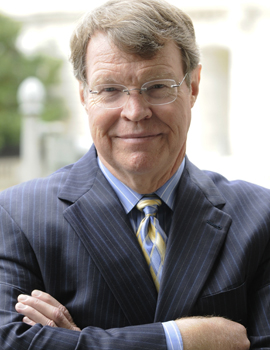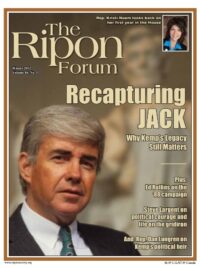
President George W. Bush set exactly the right tone for the immigration debate in a 2006 Oval Office address.
“We are a nation of laws, and we must enforce our laws,” he stated. “We’re also a nation of immigrants, and we must uphold that tradition, which has strengthened our country in so many ways.”
While I suspect that nearly every Republican agrees, keeping that balanced tone has been a challenge—especially in an election year.
A decade-long explosion in illegal immigration, which only recently leveled off, along with a high unemployment rate and increasing Mexican gang violence, has led to growing public concern—even outrage—and widespread calls for the government to get control of the borders.
The Pew Hispanic Center estimates that the number of illegal immigrants grew from 8.4 million in 2000 to 12 million in 2007—a nearly 50 percent increase in eight years. That number declined to 11.2 million in 2010.
President Obama has, albeit unintentionally, been very effective in reducing the number of illegal immigrants. His lousy economic and restrictive regulatory policies have suppressed the normal economic bounce back after a recession. So it is likely that the current number of illegal immigrants is now even lower than the 2010 level.
President Obama has, albeit unintentionally, been very effective in reducing the number of illegal immigrants. His lousy economic and restrictive regulatory policies have suppressed the normal economic bounce back after a recession.
Illegal immigrants may also feel less welcome. The red states of Arizona, Alabama, Georgia, Indiana, South Carolina and Utah have passed similar laws to crack down on illegal immigration. The Department of Justice has sued Arizona and Alabama, claiming that state laws infringe on the federal government’s right to regulate immigration. In addition, judges have blocked several provisions in the various state bills, while letting others stand.
These developments, along with some of the rhetoric, have created a real messaging problem for Republicans. Some of the GOP presidential candidates have taken a strong anti-illegal immigrant stand, but haven’t explained what they would do to address the problem except securing the border. Newt Gingrich tried to rise above the negative statements by proposing a way to help illegal immigrants become legal—not citizens—by setting up a guest worker program.
By contrast, Mitt Romney and Rick Perry got into a verbal tussle during the debates, with Romney attacking Perry for allowing children of illegal immigrants to pay in-state college tuition—which is not a tax subsidy, just lower tuition—while Perry attacked Romney for hiring a lawn service that apparently hired some illegals. Let’s just say it wasn’t their proudest moment.
As a result, the Somos Republicans, the largest Hispanic Republican group, has just endorsed Gingrich, who is, whether you agree with it or not, doing the best job of articulating a positive tone and vision for reform.
I explained in my regular Forbes column last summer why Hispanics will not save Barack Obama in 2012, as so many in the media love to suggest. Even so, the Hispanic population is growing—in number, power and income. And they tend to be socially conservative and entrepreneurial—both solid Republican constituencies.
If Republicans can reach out and work with Hispanics to propose immigration reform that provides widespread economic opportunities without amnesty, then Hispanics might find a new political home.
If Republicans can reach out and work with Hispanics to propose immigration reform that provides widespread economic opportunities without amnesty, then Hispanics might find a new political home.
What would that reform look like? It would start with a guest worker program. Foreigners would pay a fee to enter to work, and they should be required to report in and renew their permit periodically. A widely available temporary green card program that allows aliens to work and pay taxes would greatly reduce, although not eliminate, the strain on the borders.
The U.S. desperately needs a system in which highly skilled, low-skilled and entrepreneur immigrants can temporarily work and invest in the U.S. But permission to work is not a ticket to citizenship; that’s an entirely different issue and should be addressed separately.
Guest workers should not be able to receive welfare benefits. Those with children should be able to enroll them into public schools—they do that now—perhaps with an up-front charge. But they would be paying state and local taxes to help cover those costs. They could also be required to have a very basic health insurance policy to minimize dependence on the health care system.
What to do about those who have been here for many years? Nothing. There is no political consensus to either deport them or allow those who broke the law by coming here to become citizens. Those who have been living in the U.S. illegally for years could enroll in the guest-worker program just like others—a path to legality, not citizenship.
It’s time the country had a serious debate about immigration reform… again. If Republicans take the lead in proposing a positive reform that provides economic opportunities and a life out from the shadows, they could find immigrants who eventually do become citizens are solid GOP voters.
Dr. Merrill Matthews is a resident scholar at the Institute for Policy Innovation in Dallas, Texas.




